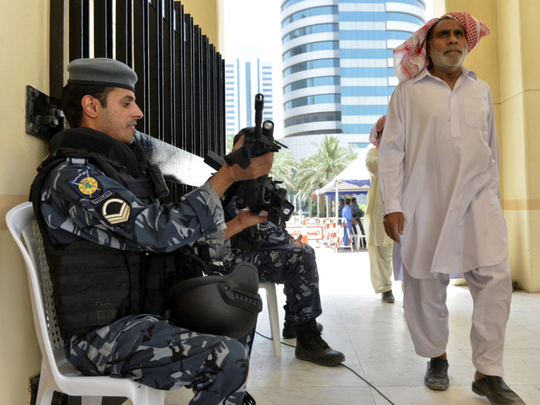
Dubai: Two brothers arrested in Saudi Arabia had transported the explosives used in the suicide bombing of a Shiite mosque in Kuwait, the interior ministry said Tuesday.
It said Majed Al Zahrani and Mohammad Al Zahrani smuggled in the explosives in an icebox by car through Nuwaiseeb border post from Saudi Arabia, a day before the June 26 bombing that killed 27 people.
The two Saudis then delivered the explosives near the border post to Abdul Rahman Sabah Eidan Saud, a stateless Arab who passed them on to the suicide bomber and drove him to the target mosque, the ministry said.
It said tests had shown that the explosives were of the same type as used in two similar attacks on Shiite mosques in eastern Saudi Arabia.
In Saudi Arabia, the interior ministry said Mohammad Al Zahrani was arrested in Khafji, another border town near Nuwaiseeb, after a shootout with Saudi security forces.
Saudi state news agency SPA reported on Tuesday that authorities have arrested three brothers linked to the bombing .
Daesh said it carried out the attack, which appeared aimed at stoking sectarian hatred in the Gulf.
The three Saudi brothers, who were not identified, were “parties to the crime of the sinful terrorist bombing that targeted the Imam Al Sadeq mosque in Kuwait”, SPA quoted a security spokesman for the interior ministry as saying.
One was arrested in Kuwait and will be extradited to the kingdom, another was arrested in the western city of Taif and a third was taken into custody after a shoot-out at a house near the Kuwaiti border that wounded two policemen.
A fourth brother lives in Syria and is a member of Daesh, the security spokesman added.
The second brother was arrested in Taif while the third was spotted in Khafji and the police placed the house in which he was hiding under siege, the spokesperson said, according Saudi Press Agency (SPA).
The suspect fired at the policemen surrounding the house as they asked him to surrender, he added.
“The police fired back as is stipulated in the regulations and eventually stormed the house where they arrested him. Two policemen were injured in the exchange of fire and were transferred to a hospital for treatment,” he said.
On Friday a Saudi policeman was shot dead during a raid in Taif, where officers said they found Daesh flags.
Three suspects were arrested. A fourth escaped but was later killed in a gun battle with law enforcement officers, the interior ministry said.
Kuwait has said more than 40 people there could face charges in connection with the blast.
Gulf interior ministers on Friday held an emergency meeting in Kuwait after the string of bombings and called for coordination to confront what they called a “serious epidemic”.
The bombing was Kuwait’s deadliest militant attack, and the most lethal in any of the six Gulf Arab states since a campaign of Al Qaida bombings was stamped out in Saudi Arabia a decade ago.
The attack has raised concerns about the number of young Saudi men willing to travel to attack Shiites in smaller Gulf Arab states and so make good on a threat by Daesh to step up violence during Ramadan.
The group claimed two suicide bombings carried out on May 22 and May 29 on Shiite mosques in eastern Saudi Arabia, where the bulk of Saudi Arabia’s Shiite community lives.
The Saudi branch of the militant group has said it wants to clear the Arabian Peninsula of Shiites and urged young men in the kingdom to join its cause.
Kuwait, Saudi Arabia as well as Bahrain have taken tremendous measures to ensure the safety of worshippers at mosques and in places of religious congregations.
In Bahrain and Kuwait, Sunnis and Shiites have prayed together in an indication that the attempts to inflame sectarian tension in their countries were doomed to fail.
— with inputs from Reuters, AFP and Habib Toumi, Bahrain Bureau Chief












